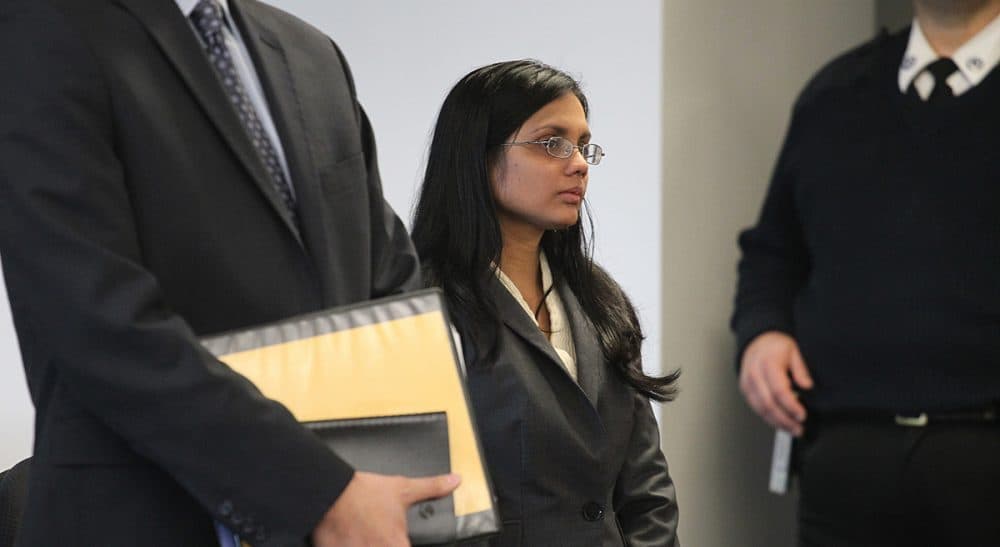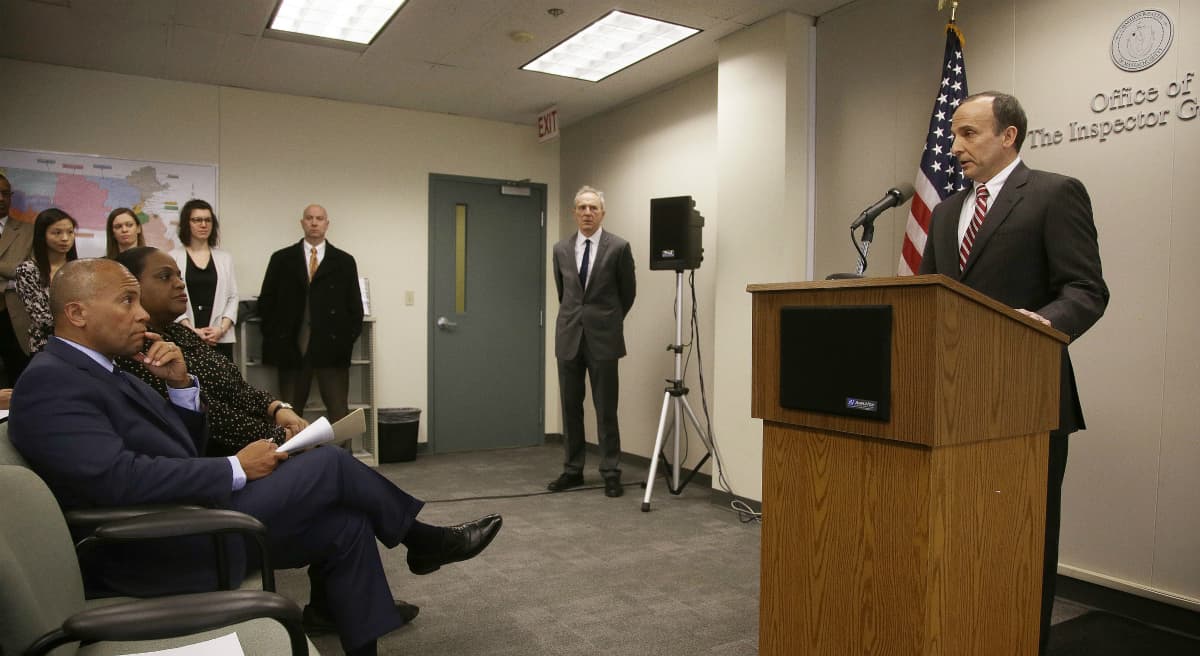Advertisement
The SJC Says What The Inspector General Won't: All Of Annie Dookhan's Cases Stink

Tuesday’s report from the state inspector general made a glaring indictment of Annie Dookhan and others associated with the drug-testing scandal at the now-infamous Hinton Lab. Nonetheless, it shied away from urging bold action to actually fix the system. Fortunately, on the very next day, the state's highest court stepped into the breach.
The IG report indicates that lab supervisors and Department of Public Health officials didn’t simply ignore Annie Dookhan’s egregious misconduct — they covered it up. In one example, a Department of Public Health official admonished someone who complained about Dookhan — that is, a whistle blower — not to tell anyone about her misconduct and forgery. Others who complained were told that their concerns about Dookhan had been addressed, when in fact they hadn’t.
Yet the IG report's conclusions were toothless. Most surprisingly, it said that Annie Dookhan was the lab's sole "bad actor." If the IG believes that silencing whistle blowers is not "bad" acting then — to borrow a line from "The Princess Bride" — someone should tell the IG that the word "bad" does not mean what he thinks it means.
it is now impossible for anyone to claim, with any seriousness, that any Dookhan defendants got due process when they were convicted.
More fundamentally, the IG report provided no clear path forward for resolving the thousands of cases affected — and lives ruined — by tainted evidence. For instance, the report still did not provide a list of the cases implicated by this massive fraud, even now that nearly three years have passed since lab managers learned of Annie Dookhan’s misconduct.
Fortunately, on Wednesday, the Massachusetts Supreme Judicial Court went further. In rulings on a half-dozen cases stemming from the drug lab scandal, the Court effectively said what the report did not — that every conviction in a case in which Annie Dookhan served as a chemist must be considered suspect.
The Court ruled that egregious government misconduct must be presumed, rather than worked out through litigation on a case-by-case basis, for the tens of thousands of cases affected by the Hinton drug lab scandal.
The Court also ruled that, in each and every case, prosecutors will be barred from arguing that they simply would have retested the supposed drugs if defendants had been told about Dookhan's misconduct. Because so much of the evidence is missing or in doubt, it’s too late for that.
In a petition now before the SJC, the ACLU of Massachusetts has asked the Court to continue to shift the burden of proof from defendants to prosecutors. After all, it was the state — not the defendants — who committed this fraud on our criminal justice system.

First, we have urged the Court to ensure that prosecutors ascertain which convictions they think can be upheld, rather than putting an unfair burden on defendants to show the role of tainted Hinton Lab evidence that prosecutors used against them.
Second, we have asked the Court to protect defendants from being penalized with harsher sentences than the ones they originally received simply for exercising their right to challenge tainted convictions. It violates both due process and common sense to punish people for seeking redress for a fraud that the state perpetrated upon them and the entire justice system.
Massachusetts’s highest court seems to have grasped an essential truth about this scandal: it is now impossible for anyone to claim, with any seriousness, that any Dookhan defendants got due process when they were convicted. As a result, we can either implement a comprehensive resolution of these cases, or we can spend many years and hundreds of millions of taxpayer dollars trying to unscramble these broken eggs. The Commonwealth should accept that re-prosecuting 43,000 or more people convicted with tainted evidence is a waste of resources that does nothing to enhance public safety. After all, many of the people convicted with this tainted evidence have long-since served any jail time and already live among us. This isn’t about letting dangerous people out of jail; it’s about restoring integrity to our criminal justice system.
This isn’t about letting dangerous people out of jail; it’s about restoring integrity to our criminal justice system.
Going forward, the inspector general’s report proves that avoiding future scandal isn't as simple as building a better lab; we need to build a better criminal justice system. Instead of merely trying to keep labs from making huge mistakes — which is easier said than done — we should limit the power that chemists and prosecutors wield over convictions and sentencing.
One way to limit that power is to eliminate mandatory minimum sentences. Those sentences have permitted chemists and prosecutors to extract guilty pleas and choose sentences in drug cases, and the result has been the biggest criminal justice scandal in the Commonwealth's history. Another way is to ensure that drug labs operate separately from law enforcement. Due process and fairness require that convictions based on scientific expertise be independent of both the prosecution and defense.
It’s nonsense to claim that the solution to this enormous scandal is to hire more or even better chemists. Instead, it's time to scrap mandatory minimum sentences, give discretion back to judges, and build a forensic science system that is honest and just. That’s the only way to rebalance the scales of justice in Massachusetts.
This piece was co-written by Matthew Segal. Segal joined the ACLU of Massachusetts as legal director in 2012, and was previously an assistant federal defender in Asheville, NC.
Related:
- WBUR Special Report: Bad Chemistry
- More from Carol Rose...